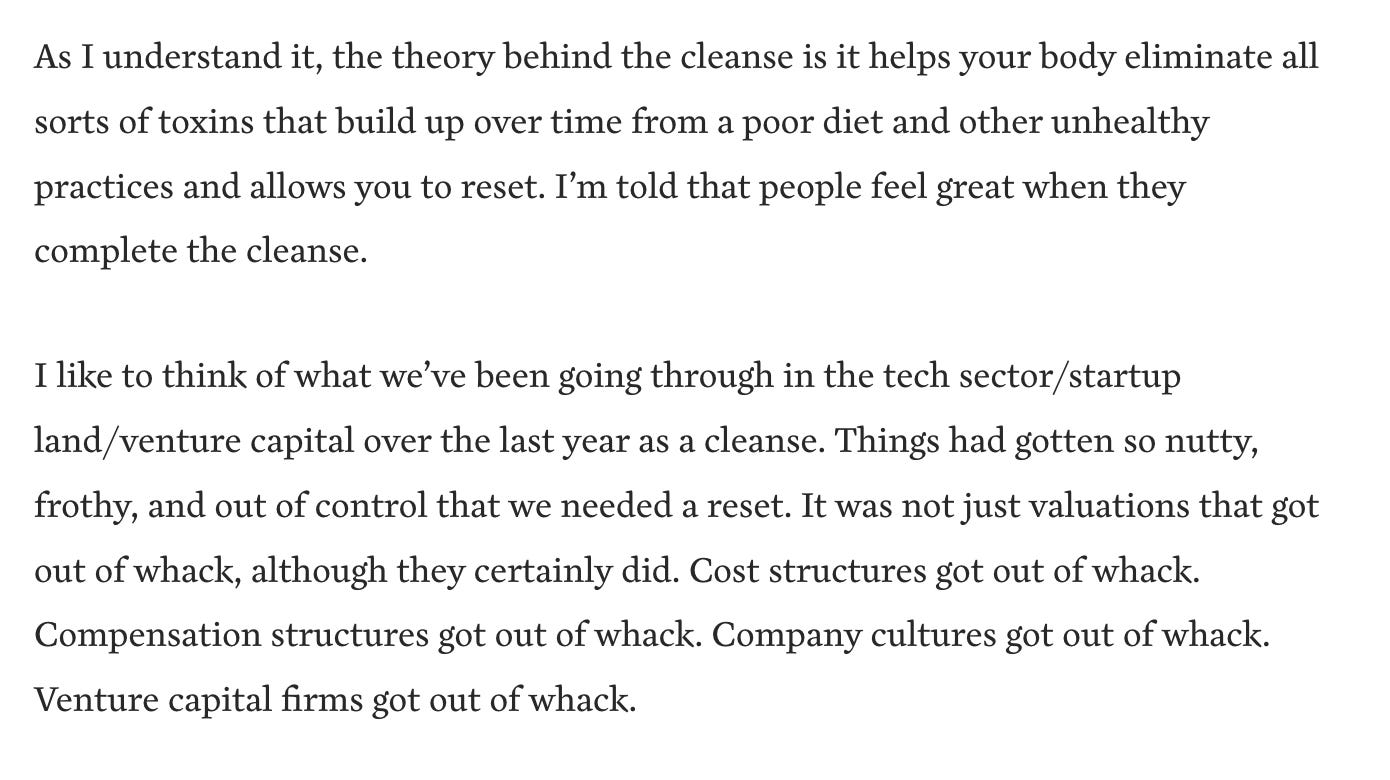Making Money
It's cool again
Hi folks, Patrick Ryan here from Odin.
We build powerful tools for VC’s, angels and founders to raise and deploy capital seamlessly.
Fred Wilson published a great newsletter back in January called “The Cleanse”.1
It feels like the cleanse is now well underway. The biggest bank in the sector (SVB) has gone bust. Companies are dropping like flies. VCs are struggling to raise new funds. Scandal abounds.
A couple of cases in particular jumped out to me this week:
The SEC is investigating the former CEO of Stripe competitor Bolt about alleged securities fraud. The company was valued at $11B in January 2022. That year, post-raise they managed about $40m of revenue. That’s a 275x forward revenue multiple.
Getir, the last man standing in Europe’s “fast grocery delivery wars” (they acquired main competitor Gorillas in December), is auctioning off their UK assets and asking their staff to go door to door selling snacks to stem their bleeding. Its valuation was already reportedly halved in April, and there are further reports that they are scrambling for more cash after exiting the French, Spanish and Portuguese markets.
I remember speaking to a corporate investor who analysed Getir’s finances before passing on their series B in 2020. I was surprised - I knew they’d succeed in raising significant follow on funding at higher valuations. There was so much hype around the business.
He wasn’t a startup guy, but he had a lot of experience in FMCG and retail.
He said to me “this business will never make money”.
In his view, the unit economics simply did not add up. So he passed.
Now, of course, he could well turn out to be wrong in the long term. But I think this highlights an important point: Venture capitalists and the LPs who put money into their funds aren't necessarily looking for a successful product (although they won’t turn their nose up at one). The endgame is an exit. If you can sell the company or get it to IPO, it doesn’t matter whether or not it makes money.
The Silicon Valley VC playbook in the last ~25 years (at least for consumer goods & services) has been relatively simple: “Offer stuff cheaper than anyone else, even though you lose money for years, until you scale to unimaginable proportions. Then, once you've crushed the competition and become the only game in town, you can raise prices and make your money back.”2
This sort of thing was sort of fine whilst the public markets and central banks were willing to play along. Uber, Lyft and many other companies managed to ride the wave all the way to IPO. Notably, neither of the big ride hailing companies makes money, to this day.
I always remember that clip from the TV show “Silicon Valley”, where Russ Hanneman (their biggest investor) tells Richard and the team to avoid revenue at all costs, because it will harm their valuation:
"It's not about how much you earn, it's about how much you're worth. And who's worth the most? Companies that lose money."
This is intended to be a farcical parody, but it has become closer and closer to the truth over time.
At some point in the last ~5 - 10 years, people started backing stuff that makes very little sense.
Does the Getir model actually address a need in a way that will ever make money? It only seems to work in densely populated areas where you’re a 5 minute walk from a shop anyway.
Was Bolt ever going to grow into an $11B valuation? Certainly not any time soon.
Crypto was probably the zenith. 99% of crypto projects are magic internet beans - no inherent value, no business model, just speculation.3
But as long as you can pass the bag to someone else, it doesn’t matter.
Almost all of us got caught up in this. I certainly did. I remember telling that guy he was crazy to pass on Getir.
What does this all mean for European founders and investors?
For most, I think it means going back to business 101.
I suspect this is especially true in Europe, because your exit options are thinner on the ground even in the good times, and the growth investment ecosystem (series B and above) is much more immature. I guess for investors, the same logic holds.
What I wonder about more is the outlook for people trying to build game-changing technology at the frontier of what is humanly possible. Things like space, life sciences, quantum computing, etc. A lot of these businesses only work with venture funding. Many great “deep tech” companies are probably going to really struggle to raise money, and that’s a shame.
However, overall I agree with Fred Wilson. This is a good thing. When we come out of the other side of the cleanse, I think some incredible businesses will have been built.
What doesn’t kill you makes you stronger.
Raising a round? Setting up a fund? Putting together an angel syndicate? Odin makes doing all of the above possible in a few clicks.
Dinosaurs
I thought this graph was interesting (thanks Harry for sharing). Since 2009, US GDP has almost doubled. Eurozone GDP has barely moved.

I’m sure the reasons for this are complex, but you do just get a general sense that a lot of people in Europe (UK included) aren’t really that interested in getting sh*t done. They generally seem keener on stuff like regulation, moaning and getting rid of immigrants.
If I were emigrating from a developing country, I don’t know if I’d have my sights set on Europe. According to data from Acorn Macro Consulting, the BRICS countries (Brazil, Russia, India, China & South Africa) have now surpassed the G7 in terms of GDP, based on Purchasing Power Parity (so ignoring currency value and thinking more in terms of how much it costs in local currency to buy a loaf of bread, build a house, etc.)

The GDP of the BRICS countries is also growing faster.
I assume this is mainly driven by India, China and Brazil. Russia certainly isn’t in good shape at the moment, and South Africa has historically grown about half as fast as India and China.
Interestingly, these countries are also trying to reduce dollar reliance, moving to a gold standard as their international currency system instead.
What will the impact of all of this be?
I have absolutely no idea to be honest, but it feels like we are entering a new world.
That being said, it is important to have some perspective. It isn’t all doom and gloom. You just need to zoom out a bit.
Kind of gross but also interesting
I wonder what they taste like.
Everything is just vibes, all the way down
I’ve been reading a book called “Our Mathematical Universe” by Max Tegmark, which explores things like multiverse theory and quantum mechanics.
Most of it is really confusing. I quite liked the sound of string theory though.
When you get a vibe from someone, remember, it’s not woo woo, it’s physics.
“[If we could slam particles together with ten trillion times more energy than is possible today], we’d find out that everything is made of tiny vibrating strings, and different types of vibrations of the same basic type of strings correspond to different types of particles (electrons, quarks, positrons, Higgs bosons, etc), a bit like different types of vibrations of a guitar string correspond to different musical notes.”
A problem shared is a problem halved
Banter
For those who don’t know, “sparky” is a British slang term for an electrician.
That’s it for today. Have a great week!
PR
The Cleanse - thanks Ollie Blears for sharing this with me at the time!
This, in and of itself, is arguably predatory pricing and therefore illegal under antitrust law (see this great Insider article from Adam Rogers for more on the subject). Even if the companies never make money, the VCs that backed them have profited from the pricing strategy, which you can argue is not strictly legal. Interestingly, the rules around predatory pricing were introduced in response to the monopoly that Standard Oil built, which I wrote about recently.
Crypto folks - don’t get me wrong, I still suspect there is a lot of value in the space, and I hold BTC and ETH. I just think a lot of it is very hand wavey.








